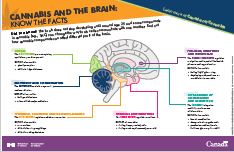Cannabis and the brain: Know the facts

Download the alternative format
(PDF format, 18.6KB, 1 page)
Organization: Health Canada
Published: 2019-04-12
Cat.: #H14-312/2019E-PDF
ISBN: #978-0-660-30068-9
Pub.: #180882
Did you know? The brain continues to develop until the age of 25 and some compounds in cannabis (e.g., THC) can change the way brain cells communicate with one another. Find out how cannabis compounds can affect different parts of the brain.
Senses
The occipital lobe processes vision, spatial cues, and movement.
Impact of cannabis:
- visual perception
- ability to judge distances
Movement and coordination
The cerebellum controls movement and coordination.
Impact of cannabis:
- feelings of dizziness
- a loss of balance/coordination
Thinking, planning and decision-making
The hippocampus registers and stores memories.
Impact of cannabis:
- memory loss
- difficulty learning new things
- difficulty making decisions
Feelings and emotions
The limbic system regulates emotions.
Impact of cannabis:
- feeling happy, excited, calm
- feeling anxious, depressed, paranoid
Integration of Information and perception
The thalamus integrates and helps make sense of information.
Impact of cannabis:
- loss of coordination
- changes to sleep-wake cycle
- psychosis or schizophrenia (in those who are vulnerable)
Feelings, emotions and behaviour
The nucleus accumbens regulates motivation and is part of the brain's pleasure and reward system.
Impact of cannabis:
- feeling "high" when using
- developing a dependence on or addiction to cannabis